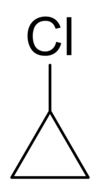Chlorocyclopropane
Appearance

| |
| Names | |
|---|---|
| Preferred IUPAC name
Chlorocyclopropane | |
| Other names
Cyclopropyl chloride, cyclopropylchloride
| |
| Identifiers | |
3D model (JSmol)
|
|
| ChemSpider | |
| EC Number |
|
PubChem CID
|
|
| UNII | |
CompTox Dashboard (EPA)
|
|
| |
| |
| Properties | |
| C3H5Cl | |
| Molar mass | 76.52 g·mol−1 |
| Density | g/cm3 |
| Melting point | −97.68 °C (−143.82 °F; 175.47 K) |
| Related compounds | |
Related compounds
|
Fluorocyclopropane Bromocyclopropane Iodocyclopropane Pentachlorocyclopropane |
Except where otherwise noted, data are given for materials in their standard state (at 25 °C [77 °F], 100 kPa).
| |
Chlorocyclopropane is a organochlorine compound with the chemical formula C3H5Cl.[1] The compound is a member of haloalkane family.[2]
Synthesis
[edit]The compound can be obtained by photoreaction of cyclopropane and chlorine gas; the reaction will generate polychlorinated compounds, which can be separated by physical means.[3]
Chemical properties
[edit]The compound isomerizes on heating to 3-Chloropropene.[4] Chlorocyclopropane reacts with lithium metal in ether to produce bicyclopropane. Also, it reacts with magnesium to obtain cyclopropylmagnesium chloride.[5]
See also
[edit]References
[edit]- ^ "chlorocyclopropane". NIST. Retrieved 31 May 2023.
- ^ Murin, A. N.; Murin, I. V.; Kazakov, V. P.; Sivkov, V. P. (1 May 1972). "NQR study of the nature of C-C1 bonds in chlorocyclopropanes". Journal of Structural Chemistry. 13 (3): 497–500. doi:10.1007/BF00743850. ISSN 1573-8779. S2CID 94857888. Retrieved 31 May 2023.
- ^ Slabey, Vernon A. (October 1952). "Reaction of Cyclopropyl Chloride with Lithium. Isolation of Dicyclopropyl". Journal of the American Chemical Society. 74 (19): 4928–4930. doi:10.1021/ja01139a056. ISSN 0002-7863. Retrieved 31 May 2023.
- ^ Grant, R. C. S.; Swinbourne, E. S. (1 January 1966). "The thermal isomerization of chlorocyclopropane and of bromocyclopropane". Chemical Communications (17): 620b–621. doi:10.1039/C1966000620B. ISSN 0009-241X. Retrieved 31 May 2023.
- ^ Roberts, John D.; Chambers, Vaughan C. (July 1951). "Small-Ring Compounds. VI. Cyclopropanol, Cyclopropyl Bromide and Cyclopropylamine". Journal of the American Chemical Society. 73 (7): 3176–3179. doi:10.1021/ja01151a053. ISSN 0002-7863. Retrieved 31 May 2023.
